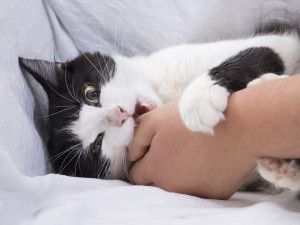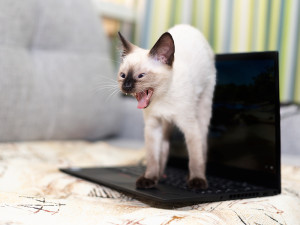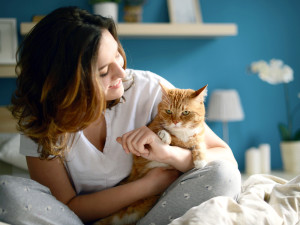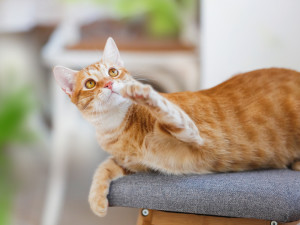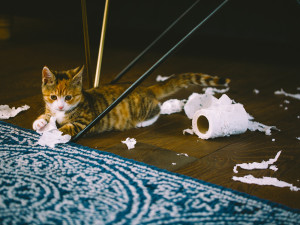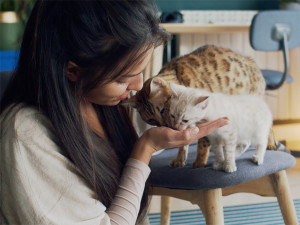Love Bite or Aggression? This Is Why Your Cat Licks Then Bites You
Cats can be such enigmas.

Share Article
In This Article:
Why Do Cats Lick Then Bite? Reasons Why Your Cat Licks Then Bites You How Do You Avoid Overstimulating Your Cat? What You Should Do When Your Cat Bites You Final Thoughts: Why Do Cats Lick Then Bite? Frequently Asked Questions
One of the most special things about cats is that they can be such enigmas. Earning a cat’s affection can be super rewarding, yet they can still remain a bit of a mystery. Case in point, you may be cuddling with your cat and they might give you a lick and then immediately follow that up with a bite. Seems a bit counterintuitive, no? But there are many reasons that a cat will follow up a lick with a bite, which we’ll explore below.
Main takeaways
A lick and then bite might mean your cat is feeling a number of different things.
Licking then biting might indicate your cat feels overstimulated, playful, or stressed.
Licking then biting might also be your cat’s way of grooming you or testing boundaries.
Why do cats lick then bite?
A lick and then a bite can communicate many different things, but according to Jennifer Van de Kieftopens in new tab, a feline behavior and feeding coach, there’s one big one. “Cats bite for many different reasons, but if a lick follows a bite, it may be affectionate, and they are grooming you, accepting you into their family,” Van de Kieft says.
However, there are a range of other reasons cats may behave this way, including feeling playful or overstimulated or are even testing boundaries.

Reasons why your cat licks then bites you
While Van de Kieft says that one of the main reasons cats bite and then lick is a sign of affection, there are a bunch of other reasons that a cat might do this potentially puzzling behavior.
Your cat is overstimulated
Have you been having an intense play session or cuddling a lot? It’s possible that your cat might have been enjoying what you were doing, but then became frustrated.
“Many cats get overstimulated from petting and sometimes intense play,” Van de Kieft says. “Always watch your cat’s body language for cues on how they are enjoying an activity.”
Your cat is feeling playful
Cats can get very playful, and playing with your cat is an important part of giving your cat a healthy, fulfilled life. A lick and then a bite might signal that your cat is ready to play. Other body language signals can also help you understand if your cat is ready for playtime, such as dilated pupils, an erect tail, or walking with an arched back. It is also helpful to have toys for solo play if you don’t have time at the moment, including tunnels or even motion-activated toys.
Your cat is grooming you
One of the cutest reasons your cat might lick and then bite you is because they might be grooming you. If you’ve ever watched your cat clean themself, you likely noticed a mix of licking and then some soft nibbles to detangle their fur. So, if your cat licks and then bites you, it might mean that they are keeping you clean, too. It’s also something they do to other cats and humans they like, so it just means you are a favorite human.
Your cat may feel stressed or anxious
Another reason a cat might lick and then bite you is because they might be feeling stressed or anxious. Cats can get stressed or anxious pretty easily if something in their environment changes, whether that’s introducing a new cat into the home or even something as small as an unexpected noise. Be sure to watch for signs of things that could potentially cause stress or anxiety for your cat, and be attentive to their behavior as well. If their behavior continues, calling your veterinarian for help is always a good idea.
Your cat is testing boundaries
It’s also possible that your cat might be testing your boundaries when it comes to playtime or petting time. Make sure to pay attention to when your cat licks and then bites you and how it comes off: is it loving or playful? Or is it clear that your cat needs some alone time? Be sure to really pay attention to your cat's needs.
How do you avoid overstimulating your cat?
Pay attention to why your cat might be overstimulated; there are many reasons why a cat might have hit its threshold. Van de Kieft has several tips for helping to not overstimulate a cat. “Always watch your cat’s body language for cues on how they are enjoying an activity,” she says.
Take petting, for example. “Take the less is more approach,” Van de Kieft says. “Stroke a few times, sticking with spots you know cats like. Most cats find petting their head and lightly scratching their cheeks enjoyable. Some cats also like stroking along their back, but some cats do not like this, particularly as you get closer to the tail. Stop petting and see if your cat is indicating they want more. They may look at you, rub against you. You can let your cat sniff your hand/fingers and if they lean into your hand, it’s a sign you can pet them again.
A cat might also get overstimulated during playtime, which is why Van de Kieft says having a cool-down period is a good idea. “For playtime, you want to work on reducing arousal [and] providing exercise, but without overdoing it. Slow play down towards the end then provide a snack or treat.”
Other behaviors that indicate your cat is overstimulated
Pay attention to your cat’s body language to tell if they are overstimulated. Look for dilated pupils, a swishy tail, skin twitches, exposed claws, or a crouched position.
What you should do when your cat bites you
According to Van de Kieft, you need to be attentive to why your cat has bitten you and go from there.
“Assess the situation,” she says. “Were you petting too much? That gives you information to pet less next time. Is your cat hungry? Rethink your feeding routine. Does your cat need to play? Add playtime before bites occur. Cat behavior requires some detective work, and the goal is to prevent unwanted behaviors by meeting your cat’s needs in an acceptable way.”
Final thoughts: Why do cats lick then bite?
Paying attention to your cat’s behavior associated with when they lick and then bite can mean many different things. Most of the time it is a loving, grooming, or playful gesture. But in some instances, it can signal stress, anxiety, or boundary setting.
FAQs
Do cat licks mean kisses?
Yes, cat licks can be a sign of affection. Licking can be a cat’s way of showing you that you are family or can also be a sign that your cat is grooming you, which is another sign that they love you.
Should I let my cat lick me?
Generally, it’s fine to let your cat lick you on your hands or arms, but try to avoid having your cat lick your face or any open wounds.
Why does my cat grab my hand then bite me?
Similar to licking and biting, a cat grabbing your hand and then biting you can mean many things, from your cat wanting to play to their attempt to groom you. It can also indicate that your cat might be stressed or anxious, so pay attention to the context of their behavior and your cat’s body language.
Why does my cat randomly bite me while purring?
This would be considered a love bite. It’s a sign of affection or playfulness because of the purring, and the bite is a way of showing excitement or even a bit of overstimulation.

Kerensa Cadenas
Kerensa Cadenas is a writer based in New York City. She’s previously worked at The Cut, Thrillist, Cosmopolitan, and Complex. Her work has been featured in Vulture, GQ, Vanity Fair, and others.
Related articles
![An angry and hissing Siamese kitten standing on top of a laptop computer in the living room]()
You Don’t Have to Live Like This—You Can Get a Trainer For Your Cat
Tips to help you find a legit behaviorist (according to a veterinary behaviorist).
![Woman trying to hug a grumpy orange cat.]()
People Are Bad at Knowing When Their Cats Are Pissed, New Study Says
We can tell when cats are happy, but we’re pretty bad at figuring out when they’re not.
![orange cat lifting its paw]()
Why Do Cats Raise a Paw for No Reason?
Are they saying “Hi” or trying to high five? Cat behaviorists decode your pet’s cryptic hand signal.
![A calico tabby kitten chewing and tearing a roll of toilet tissue.]()
Why Does My Cat Chew On Everything?
How to decode your cat’s chewing habits when they’re nibbling on all the things.
![kittens licking woman's hand]()
Curious Cat Behavior: Why Does My Cat Lick Me?
Hey, everybody’s got their thing.
Why Is My Cat Suddenly Clingy?
They’re never far away, but you’d like a little distance.
